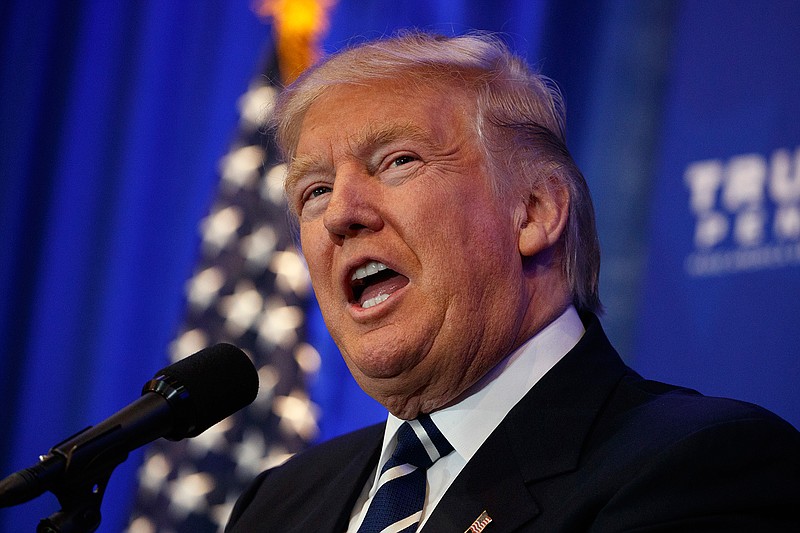AUSTIN, Texas-Texas stayed as reliably conservative as ever Tuesday on a big night for Republicans nationally, with Donald Trump locking up its 38 presidential electoral votes and a party-switching judge losing his re-election bid to ensure that a Democrat still hasn't won statewide office in a worst-in-the-nation 22 years and counting.
Trump appeared on pace for a margin of victory below 10 percentage points-a relatively narrow win considering that every GOP White House nominee since 2000 had coasted to double-digit romps in America's largest red state. But the race also wasn't as close as some polling last month, which suggested Hillary Clinton could actually get within striking distance.
And the results answered lingering questions about whether traditional Texas Republicans would embrace such a bombastic and nontraditional candidate. Even former President and Texas Gov. George W. Bush and his wife Laura declined to vote for Trump, "choosing none of the above" on early ballots they cast two weeks ago, according to spokesman Freddy Ford."Trump wasn't my first, second, third, fourth or fifth choice. He was the one who survived the primaries," said Lyndon Joslin, a 60-year-old who cast his ballot at a southwest Houston elementary school. "This is just like another deal he's trying to strike. Being somebody who's been on reality television, this is almost like another showbiz turn for him."
Befitting the Republican nominee's affinity for the word "huge," though, Trump's win came on a record-shattering night for Texas. The state exceeded 15.1 million registered voters for the first time, while voter turnout broke 2008's record of just over 8 million. The billionaire businessman's win also means the state still hasn't supported a Democrat for president since Jimmy Carter 40 years ago.
Clinton had hoped to pull off an upset after Trump's repeated insults of Latinos, his promises to build a towering wall along the entire 2,000-mile U.S.-Mexico border and his harsh immigration rhetoric. Texas' 10.2 million Hispanics represent 39 percent of the state's population, but only about 5 million are eligible to vote as U.S. citizens 18 or older. Associated Press exit polling showed that roughly six in 10 Texas Hispanic voters were backing Clinton-but it wasn't enough.
Meanwhile, not all Texas Hispanics favored Clinton. Clemente Ruiz, a Lubbock truck driver, said he agreed with Trump on many hot-button topics: "I'm 100 percent for the border, for the fence, and I'm for militarizing the border."
Democrats still looked for a potential bright spot in a West Texas congressional district sprawling from San Antonio to suburban El Paso and encompassing 800-plus miles of largely sparsely populated U.S.-Mexico border. There, former Democratic congressman Pete Gallego was locked in a dead-heat with Republican U.S. Rep. Will Hurd, who unseated him two years ago.
A former CIA agent and one of just three black Republicans in Congress, Hurd's district is nearly 70 percent Hispanic and has flipped between parties three straight cycles. Hurd was hoping not to be hurt by urging Trump to abandon the Republican presidential nomination after the release of a 2005 recording in which the New Yorker bragged of grabbing and kissing women without permission.
Texas' other 35 congressional races weren't competitive. All Texas House seats and 16 state Senate seats were also on the ballot-though both chambers will remain comfortably Republican-controlled when the Legislature reconvenes in January.
Gov. Greg Abbott, Lt. Gov. Dan Patrick, U.S. Sen. Ted Cruz and other top statewide officials aren't up for re-election until 2018.
On the Court of Criminal Appeals, however, Lawrence Meyers is the senior justice and was first elected as a Republican in 1992. He switched parties in 2013 and lost his re-election bid on Texas' highest criminal court as a Democrat on Tuesday to Harris County Republican District Judge Mary Lou Keel.
Keel's win means the Republicans again control all 23 of Texas' statewide offices and ensure that a Democratic statewide electoral losing
streak dating back to 1994 will continue for at least two more years.
Texas was once as loyally Democratic as it is now Republican. Thomas Perry, a 31-year-old Clinton supporter and studio technician in Dallas, said he can imagine the state one day switching back.
"This is my first time seeing this many Democrats," Perry said ofwatching people cast ballots opposing Trump on Tuesday. Asked if he thinks Democrats will ever break the statewide losing streak, Perry replied: "I think it's really possible."

